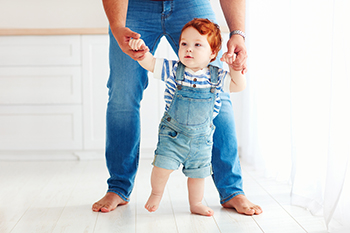NJ (908) 688-5577
NY (212) 737-2528

It’s hard to pinpoint exactly when a baby should be walking because they develop at different times. Many babies begin walking as early at 8 or 9 months, while others who are so-called late-bloomers may not begin until 16 months. Generally speaking, about half of babies have begun to take steps around 1 year old. The three factors that go into the process include muscle strength, balance, and temperament. The latter is the factor that most affects the age at which your baby will walk, experts say. Some babies continue to crawl because they can move faster than if they try to stand and walk. Early walkers can be more driven to try new motor skills, and lean babies often begin to walk earlier. Most babies simply decide for themselves when they are ready to walk, studies show. If you notice that your baby has certain foot gait abnormalities, such as pigeon-toed, walking on tiptoe, or duck walking, it is a good idea to see a podiatrist for an examination and discussion on possible treatment.
The health of a child’s feet is vital to their overall well-being. If you have any questions regarding foot health, contact Glenn Davison, DPM of Advanced Podiatry. Our doctor can provide the care you need to keep you pain-free and on your feet.
Tips for Keeping Children's Feet Healthy
If you have any questions, please feel free to contact our offices located in Union, NJ and New York . We offer the newest diagnostic and treatment technologies for all your foot care needs.